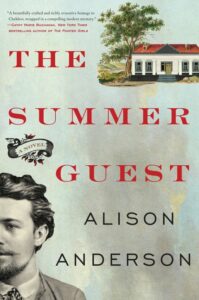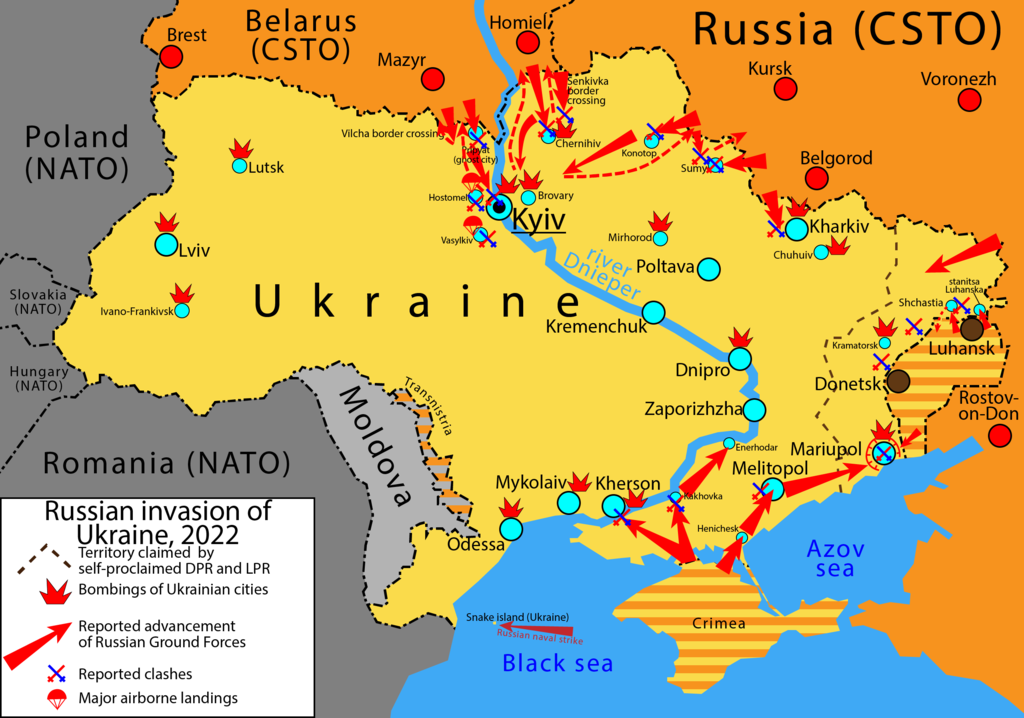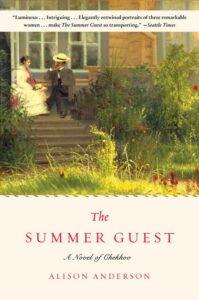
Transported to 19th century Eastern Ukraine where an extraordinary friendship blossomed between one of the greatest short story writers and a blind doctor who saw him like no one else did (Luka, Ukraine 1888-1891; London, a French village, Geneva 2014): Alison Anderson’s The Summer Guest is an elegant stunner of historical fiction. Prose as enchanted as can be. Inspired by a little-known, enchanted friendship.
Released in 2016, set mostly over two summers from 1888 to ‘89, the novel couldn’t be more poignant in the summer of 2022 when Russia’s war against Ukraine has devastated a long ago bucolic countryside in the village of Luka, south of Kyiv. It’s here that Anderson recreates and fictionalizes Anton Chekhov’s unique relationship with a Ukrainian doctor who’d lost her eyesight to a terminal illness (also causing terrible seizures and headaches, the diagnosis revealed at the end). Chekhov was at the cusp of enormous fame. How ironic and chilling that he was born in Taganrog, Russia near the Sea of Azov bordering Ukraine’s Donbas region, an area fiercely bombarded today. Two other connected storylines set in 2014 reverberate Ukraine’s protesting of Russia’s soon-to-be takeover of Crimea.

August is Women in Translation Month, which the author co-founded. Anderson, who now devotes all her time to translating French novels (over 100), translated “The Elegance of the Hedgehog” by Muriel Barbery, a “phenomenal” success. Who better to imagine an 1800s novel – mostly written as a diary discovered in 2014 – requiring translation from the “difficult, its beauty idiosyncratic and complex” Russian language into English? A novel in which the translator character struggles with the invisibility of her profession, hoping translating the secret diary will take her out of the shadows.
Zina Lintvaryov is the blind diary writer. Her gentle, younger piano-playing brother Georges concocts a solution to enable her to write legibly enough to record the intimate conversations she exchanged with twenty-eight-year-old Anton Chekov, also a doctor, when he and his family rented a modest guesthouse on her family’s East Ukraine country estate. The richness of their private thoughts is far-ranging: literary, philosophical, passion/love/marriage, family, and the meaning of life. Made even more special by Anderson’s glowing prose.
The writing so lifelike that one of the conversational threads – Zina’s encouraging Anton to write a long novel in the Russian tradition like Tolstoy while sheltering in this peaceful place away from all his commitments – will have you guessing whether the short story writer and playwright ever wrote a novel hiding someplace. Making their tender friendship an intriguing literary mystery as well.
The two forge the emotional essence of the novel, but there’s also a large Cast of Characters, historical and fictional. The introductory list might look intimidating, so you may want to bookmark the handy cheat sheet for quick reference until you get the hang of all the names. Presented in three lists: one for each family and a third for Their Guests. The novel shows how both Zina and Anton care deeply about family, and value their friends, literature, music, and servants.
The Lintvaryovs include Zina’s mother who owns the estate, where her five children and the wife of the older son, with a baby on the way, live. The Chekhovs include the father and one more child – five sons and a daughter. Occupations are listed alongside their names. Elena, also a doctor, is the sister Zina is closest to (both serious-minded), while younger Natasha, a schoolteacher, the playful and flirty one. Anton is closest to his brother Nikolay, an artist whose health is compromised. In addition to their given names and surnames, two more names are listed and used, reflecting the Slavic tradition of naming. For instance, Anton’s full name is Anton Pavlovich (Antosha) Chekhov: given name, then father’s first name called patronymnic (as in Anton, son of Pavel, a grocer), followed by his nickname (in parenthesis), the diminutive, catchier name.

The 2014 storylines present two other female characters that matter. Both wrestling with their own issues related to the primary story, crafted so cleverly you don’t appreciate the extent of their significance until much later. The novel approaches 400 pages; nothing is fluff. Ana, the translator, is an American living in a small village in France near the Swiss border, spending much-needed time with a supportive friend in Geneva. She’s drawn from American Constance Garnett who translated Chekhov into English. Divorced, living alone for three years, the diary promises to bring her the recognition and identity she yearns for. Katya, the publisher who contacted her, emigrated from the former Soviet Union to London. The fictionalized Polyana Press realistically portrays the struggles to stay afloat triggered by the 2008 recession, causing much tension with her husband Peter. Is that all that’s going on?
Zina, Ana, and Katya all share admiration for Russian literature.
What moves us is most is Anton’s sensitivity towards Zina, and her keen perception of the elusive Chekhov. When he speaks of her “sensitivity,” he tells her: “You go beyond the surface straight to the person, to the soul, the spirit. There is something in you – a sixth sense – that removes the barriers that sight imposes in others.” She, in turn, achingly touches us believing that extra sense, blindness, is an asset in allowing her to “see” Anton’s “true self.” This happens almost immediately. “We have just met,” he says, “but people are rarely as honest with me as you have just been.” Followed by: “You don’t know me, but you know me well.” Zina accepts her fate but dreams of some “unexpected happiness of a rare, special kind” that will befall her before it’s too late. The diary is proof of that: “He restores a fractured loveliness to my blind world,” she writes. Later he shares a similar joy: “Sitting here on the veranda, talking, we are living deeply, with our awareness of each other, our questioning of life.”
The novel also provides an unusual window into how an adult who loses their eyesight moves through the world. Likewise, we get glimpses into the hidden side of this almost mythical literary giant. The prose captures the beauty and melancholy of their ephemeral friendship, and how the peaceful landscape gave them both strength.
Zina and Anton didn’t run towards love. She recalls a young man she turned away; Chekhov believes, “Love makes a muddle of creativity.” (He didn’t marry until 1901, when he was forty-one.) Gentlemanly and respectful, he often touches and kisses Zina’s fingers.
Katya isn’t responsive to Ana’s emails, such as the one asking what to do about the absence of quotes? So you’ll read the diary as penned, which lets Zina and Anton’s voices flow as if one.
The irresistible mystery is whether Chekov, who says he didn’t have “time for novels,” actually wrote one? Another provocative question is how Katya came into possession of the diary more than a century later?
The guesthouse where the Chekhovs stayed was turned into the Chekhov House Museum. Will it survive the war? Anderson has memorialized what’s in jeopardy of being lost.
Lorraine